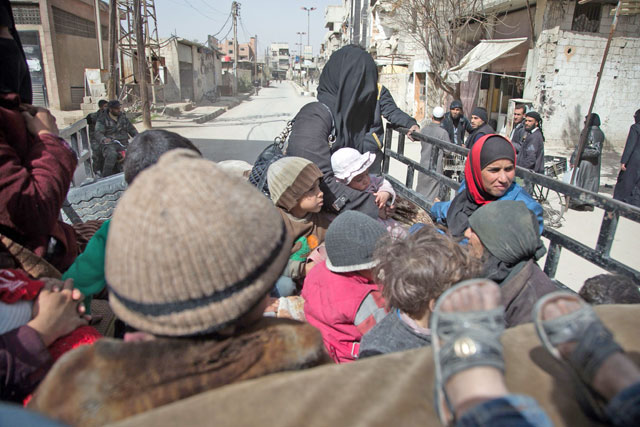BEIRUT/GENEVA — Thousands of civilians have fled advances by Syrian government forces in Eastern Ghouta over the last two days, a war monitor and a resident said, as Damascus makes rapid gains in a fierce assault against the last major rebel enclave near the capital.
Government forces need to advance just a few more kilometres further to split the enclave in two, said a commander in the military alliance that backs President Bashar Assad.
The Syrian Observatory for Human Rights said government forces had seized around a quarter of Eastern Ghouta in a ground assault that got under way on February 27, building on a ferocious air and artillery bombardment that has killed hundreds.
One of the main insurgent groups in eastern Ghouta, Jaish Al Islam, said the government's "scorched earth policy" had forced rebels to retreat and regroup, but vowed to recover lost territory.
A UN humanitarian official said 400,000 people in eastern Ghouta were being subjected to unacceptable "collective punishment", and called for the implementation of a 30-day ceasefire demanded by the UN Security Council. US President Donald Trump and German Chancellor Angela Merkel called on Thursday for the ceasefire to be implemented immediately.
With the war entering its eighth year, capturing the Eastern Ghouta area would be a major victory for Assad, who has steadily recovered control of rebellious areas with military support from Russia and Iran.
The multi-sided Syrian war, which has killed hundreds of thousands of people since 2011, has escalated on several fronts this year, as the collapse of Daesh has given way to other conflicts between Syrian and international parties.
Turkey, backed by allied Syrian militias, has gained ground in recent days against the Kurdish YPG militia in an offensive it is waging in northwestern Syria.
The UK-based Observatory, which reports on the war using what it describes as a wide range of on-the-ground sources, said the advances threaten to encircle Afrin city, where 1 million people are estimated to live. It says shelling and air strikes have killed 659 people in Eastern Ghouta since February 18, making the offensive one of the deadliest of the war, while rebel shelling of Damascus has killed 27.
Orient TV, which supports the opposition, said advances by pro-Assad forces had triggered large-scale displacement.
One resident estimated that thousands of people were on the move and seeking shelter in areas further from the frontlines.
The observatory estimated that between 300 to 400 families — roughly several thousand people — had fled areas seized by government forces since Saturday.
The pro-Assad commander said civilians were fleeing into to the town of Douma. “There are about three and a bit kilometres [to go] and they will cut [Eastern Ghouta] in two,” the commander told Reuters.
The White Helmets rescue service in Eastern Ghouta posted footage on its Facebook page showing rescue workers carrying away on a stretcher a man it said had been wounded in an air strike in Douma.
Gunfire was audible during a broadcast by a Syrian state television journalist from a position he said had been captured by the advancing forces.
The Syrian army said it had been attacking rebel positions for the last two days in response to shelling of Damascus and had recovered control of farmland and towns.
The observatory said the territory captured so far by the Syrian army was mostly farmland, with the big towns of Eastern Ghouta still in rebel hands.
‘More fighting,
more death’
With no sign of meaningful Western pressure to halt the offensive, Eastern Ghouta appears on course to meet the same fate as other rebel areas retaken by Assad, such as eastern Aleppo, which he recovered using similar tactics in 2016.
Rebels eventually withdrew from eastern Aleppo in a negotiated deal with the government, leaving to opposition-held territory near the Turkish border.
UN regional humanitarian coordinator Panos Moumtzis, said violence has escalated in Eastern Ghouta, and also noted that mortars fired into Damascus had killed and injured scores of civilians.
“Instead of a much-needed reprieve, we continue to see more fighting, more death, and more disturbing reports of hunger and hospitals being bombed. This collective punishment of civilians is simply unacceptable,” Moumtzis said in a statement.
A UN official in Syria told Reuters a humanitarian convoy carrying life-saving supplies from UN and other aid agencies would not enter Eastern Ghouta as had been planned on Sunday, citing a lack of permission.
Russia has called for daily, five-hour humanitarian ceasefires to allow for aid deliveries and evacuations of civilians and wounded. No aid has been delivered however, and the US State Department has called the Russian plan a “joke”.
The Russian military said militants had imposed a curfew to prevent civilians from leaving through a humanitarian corridor during the truce, Interfax news agency reported. Rebel officials have consistently denied stopping civilians from leaving.
Afrin
Moumtziz also expressed concern about the situation in Afrin, a Kurdish region that has been under Turkish assault since January, saying there were “disturbing reports” on civilian deaths and injuries, and restrictions on civilian movement.
Turkish forces, supported by Syrian rebel groups, seized the town of Rajo on Saturday, and Turkey’s prime minister said they were advancing towards Afrin city “step by step”.
The observatory said Turkish forces had advanced to within 12km of Afrin.
Turkey has rejected Western calls for it to suspend the Afrin assault in line with the UN ceasefire, which does not apply to Daesh, Al Qaeda and groups associated with it, or other groups deemed terrorists by the Security Council.
Turkey views the YPG as an extension of the Kurdistan Workers’ Party (PKK), which has fought a three-decade insurgency in Turkey and is deemed a terrorist group by the United States, the European Union and Turkey. The YPG has been an important ally for the United States in the fight against Daesh.
